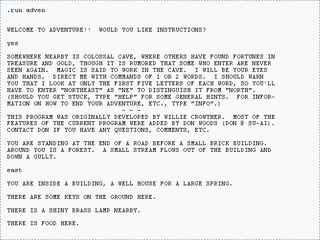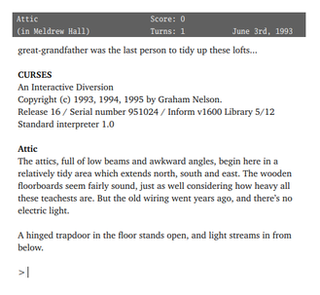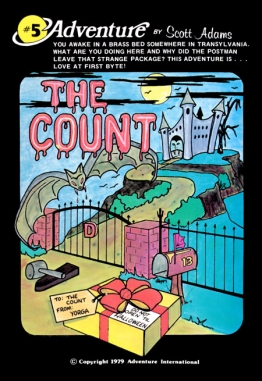Related Research Articles
Interactive fiction (IF) is software simulating environments in which players use text commands to control characters and influence the environment. Works in this form can be understood as literary narratives, either in the form of Interactive narratives or Interactive narrations. These works can also be understood as a form of video game, either in the form of an adventure game or role-playing game. In common usage, the term refers to text adventures, a type of adventure game where the entire interface can be "text-only", however, graphical text adventure games, where the text is accompanied by graphics still fall under the text adventure category if the main way to interact with the game is by typing text. Some users of the term distinguish between interactive fiction, known as "Puzzle-free", that focuses on narrative, and "text adventures" that focus on puzzles.
The Z-machine is a virtual machine that was developed by Joel Berez and Marc Blank in 1979 and used by Infocom for its text adventure games. Infocom compiled game code to files containing Z-machine instructions and could therefore port its text adventures to a new platform simply by writing a Z-machine implementation for that platform. With the large number of incompatible home computer systems in use at the time, this was an important advantage over using native code or developing a compiler for each system.
Text Adventure Development System (TADS) is a prototype-based domain-specific programming language and set of standard libraries for creating interactive fiction (IF) games.

Colossal Cave Adventure is a text-based adventure game, released in 1976 by developer Will Crowther for the PDP-10 mainframe computer. It was expanded upon in 1977 by Don Woods. In the game, the player explores a cave system rumored to be filled with treasure and gold. The game is composed of dozens of locations, and the player moves between these locations and interacts with objects in them by typing one- or two-word commands which are interpreted by the game's natural language input system. The program acts as a narrator, describing the player's location and the results of the player's attempted actions. It is the first well-known example of interactive fiction, as well as the first well-known adventure game, for which it was also the namesake.

William Crowther is an American computer programmer, caver, and rock climber. He is the co-creator of Colossal Cave Adventure from 1975 onward, a seminal computer game that influenced the first decade of video game design and inspired the text adventure game genre.
Glenn R. Wichman is a software developer and one of the original authors of the computer game Rogue, along with Michael Toy, Ken Arnold and Jon Lane. Wichman has also contributed to many other commercial software programs, including Microsoft Bookshelf, Mavis Beacon Teaches Typing and Quicken. He is the creator of the Macintosh shareware games Toxic Ravine and Mombasa.

Phoenix was an IBM mainframe computer at Cambridge University's Computer Laboratory. "Phoenix/MVS" was also the name of the computer's operating system, written in-house by Computer Laboratory members. Its DNS hostname was phx.cam.ac.uk.
Patricia ("Pat") P. Crowther, later known as Patricia P. Wilcox, is an American cave explorer and cave surveyor active in the 1960s and early 1970s. She also worked as a computer programmer.

Andrew Plotkin, also known as Zarf, is a central figure in the modern interactive fiction (IF) community. Having both written a number of award-winning games and developed a range of new file formats, interpreters, and other utilities for the design, production, and running of IF games, Plotkin is widely recognised for both his creative and his technical contributions to the homebrew IF scene.

Curses is an interactive fiction computer game created by Graham Nelson in 1993. Appearing in the beginning of the non-commercial era of interactive fiction, it is considered one of the milestones of the genre.
The Adventure Game Toolkit (AGT) is a development system for text based adventure games.

ifMUD is a MUD associated with the rec.arts.int-fiction newsgroup accessible via telnet or a MUD client. It is central to the interactive fiction community, frequented by many of the genre's best-known writers. Every year, the XYZZY Awards are hosted on ifMUD during an online ceremony.
Jon Ingold is a British author of interactive fiction and co-founder of inkle, where he co-directed and co-wrote 80 Days, and wrote Heaven's Vault and Overboard!. His interactive fiction has frequently been nominated for XYZZY Awards and has won on multiple occasions, including Best Game, Best Story and Best Setting awards for All Roads in 2001. Ingold's works are notable for their attention to the levels of knowledge that the player and player character have of the in-game situation, with the effect often depending on a player who understands more than the character or vice versa. Ingold has also written a number of plays, short stories and novels.

Nick Montfort is a poet and professor of digital media at MIT, where he directs a lab called The Trope Tank. He also holds a part-time position at the University of Bergen where he leads a node on computational narrative systems at the Center for Digital Narrative. Among his publications are seven books of computer-generated literature and six books from the MIT Press, several of which are collaborations. His work also includes digital projects, many of them in the form of short programs. He lives in New York City.

The Count is a text adventure written by Scott Adams and published by Adventure International in 1979. The player character has been sent to defeat the vampire Count Dracula by the local Transylvanian villagers, and must obtain and use items from around the vampire's castle in order to defeat him.

Fish! is a text adventure game by Magnetic Scrolls released in 1988. The game was designed by John Molloy, Phil South and Peter Kemp with contributions by Rob Steggles.

Acorn C/C++ is a set of C/C++ programming tools for use under the RISC OS operating system. The tools use the Norcroft compiler suite and were authored by Codemist and Acorn Computers. The tools provide some facilities offered by a fully integrated development environment.
Robert W. Lafore is a computer programmer, systems analyst and entrepreneur. He coined the term "interactive fiction", and was an early software developer in this field.

Aisle is a 1999 interactive fiction video game whose major innovation is to allow only a single move and offer from it over a hundred possible outcomes. It is notable for introducing and popularizing the one move genre.
References
- 1 2 3 Montfort, Nick (2005). Twisty Little Passages: An Approach to Interactive Fiction (1st MIT Press paperback ed.). Cambridge, Massachusetts: The MIT Press. p. 237. ISBN 0-262-63318-3.
- 1 2 Compton, Jason (May 1998). Horgan, Tony; Korn, Andrew (eds.). "Interactive Fiction". CU Amiga . EMAP. pp. 33–35. ISSN 0963-0090.
Take sword. Go north. Kill dragon. Ho-hum, eh?
- 1 2 Plotkin, Andrew (2014-06-24). "Old Zarf code". The Gameshelf. Archived from the original on 2017-10-26. Retrieved 2020-10-29.
- ↑ Montfort, Nick (2005). Twisty Little Passages: An Approach to Interactive Fiction (1st MIT Press paperback ed.). Cambridge, Massachusetts: The MIT Press. p. 126. ISBN 0-262-63318-3.
- ↑ "Winners of the 1995 IFComp". IFComp. Interactive Fiction Technology Foundation . Retrieved 2 July 2022.
- ↑ Montfort, Nick (2005). Twisty Little Passages: An Approach to Interactive Fiction (1st MIT Press paperback ed.). Cambridge, Massachusetts: The MIT Press. p. 208. ISBN 0-262-63318-3.
- ↑ "Frotz in the iPhone App store". Emily Short. 13 August 2008. Retrieved 2022-08-15.